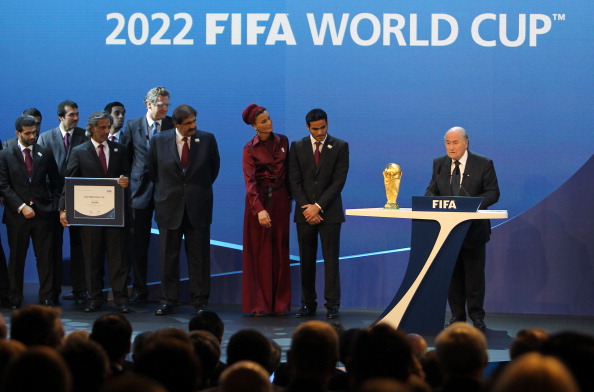By Andrew Warshaw
July 30 – Qatar’s 2022 World Cup bid team have categorically denied new revelations claiming they ran a covert campaign designed to sabotage rival bidders, specifically the United States and Australia.
The Sunday Times claims the secret campaign to disseminate negative propaganda was “funded and overseen” by Qatar’s bid committee. The newspaper’s allegations are based on leaked documents by a whistleblower who worked with the Qataris and, if true, would have broken FIFA’s bidding regulations.
FIFA rules say bidders must “refrain from making any written or oral statements of any kind, whether adverse or otherwise, about the bids or candidatures of any other member association which has expressed an interest in hosting and staging the competitions”.
The alleged smear campaign is said to have involved recruiting and paying prominent figures to criticise the bids in their own countries, thus giving the impression they lacked support at home, a FIFA pre-requisite.
Ever since Qatar achieved the biggest upset in the history of World Cup ballots back in December, 2010, the Gulf state has been inundated with unproven accusations of dirty tricks. In recent months the finger-pointing appeared to have died down but has now catapulted once again into the public domain leading to an immediate denial by Qatar’s Supreme Committee for Delivery and Legacy.
A statement said: “The Supreme Committee rejects each and every allegation put forward by the Sunday Times. We have been thoroughly investigated and have been forthcoming with all information related to our bid, including the official investigation led by US attorney Michael Garcia. We have strictly adhered to all FIFA’s rules and regulations for the 2018/2022 World Cup bidding process.”
Qatar beat the United States, Australia, South Korea and Japan to land the World Cup but it was another Sunday Times’ expose into the bid process which contributed to a two-year inquiry by FIFA’s ethics committee. Qatar was cleared of any wrongdoing in the resulting Garcia report.
According to the latest Sunday Times’ scoop, journalists, bloggers and high-profile academics were all recruited to dish the dirt on the other countries’ bids. The Qatar bid team is alleged to have employed the New York office of communications company Brown Lloyd Jones, which is now BLJ Worldwide, along with a team of former intelligence operatives.
One of the leaked emails The Sunday Times claims to have obtained was sent to Qatar’s deputy bid leader Ali al-Thawadi – brother of bid chief Hassan al-Thawadi – and allegedly shows the team were aware of plots to spread “poison” against other bidders in the build-up to the vote.
Reacting to the allegations a FIFA statement said “a thorough investigation was conducted by Michael Garcia and his conclusions are available in the report”, referring to the completed two-year inquiry by FIFA’s former ethics chief investigator. However, the Sunday Times says the documents on which the current story is based were apparently unavailable during that inquiry.
Interestingly, the newspaper is careful not to use the words “his” or “her” when referring to the whistleblower who has apparently asked for “their anonymity to be protected”.
No sooner had the article appeared than some commentators suggested the timing of the leak was linked to Qatar’s ongoing diplomatic and trade feud with its Saudi-led neighbours keen to undermine the 2022 hosts.
Although it is highly unlikely that FIFA will revisit calls to strip Qatar of hosting rights, the new accusations will put pressure on Gianni Infantino’s supposedly reformed organisation not to simply turn a blind eye. However, the reality of the accusations and what is now known about how the votes for 2018 and 2022 panned out, it is highly unlikely that the allegations (true or not) would have had any impact on the vote.
Any moves to take the tournament away from Qatar would be resisted with a robust legal challenge, and it would be one that FIFA would unlikely be able to afford, though might find some funding help from its new-found Saudi friends behind the $25 billion competition buyout proposal. One possibility might be an independent investigation – commissioned by FIFA but not involving FIFA personnel – but in the current geopolitical and FIFA-political climate that would likely be messier than the aftermath of the 2010 vote.
Contact the writer of this story at moc.l1745565271labto1745565271ofdlr1745565271owedi1745565271sni@w1745565271ahsra1745565271w.wer1745565271dna1745565271

